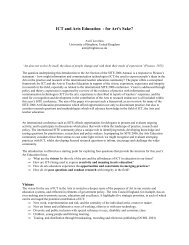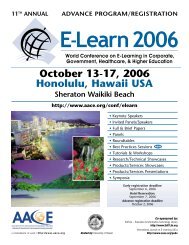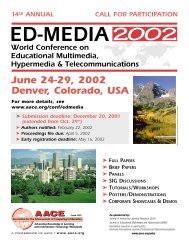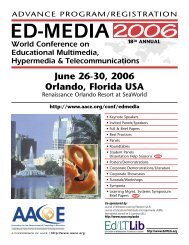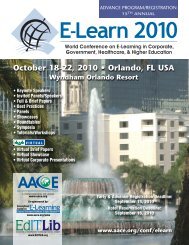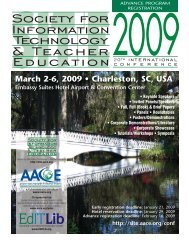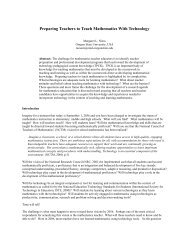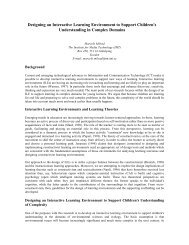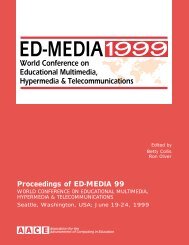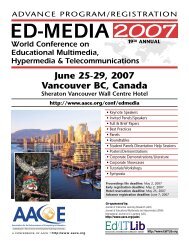Using Quality Assurance Strategies for Online Programs
Using Quality Assurance Strategies for Online Programs
Using Quality Assurance Strategies for Online Programs
You also want an ePaper? Increase the reach of your titles
YUMPU automatically turns print PDFs into web optimized ePapers that Google loves.
quality assurance issues must be addressed. The fact of change ushers bothfaculty and students into the future of education, but it is the quality ofchange that determines if its character will be that of infinite possibilities—ofprogress and growth.A report prepared <strong>for</strong> the Council <strong>for</strong> Higher Education Accreditation(CHEA) by the Institute <strong>for</strong> Higher Education Policy stated that distancelearning is growing rapidly, not only as a supplement to traditional institutionsand programs, but also as a replacement <strong>for</strong> those institutions andprograms. Furthermore, distance learning is seen by many as “trans<strong>for</strong>mative(sic) vehicle <strong>for</strong> increasing the pace of change and re<strong>for</strong>m in higher education.For these and other reasons, analysis of quality assurance is anessential topic <strong>for</strong> national, state and institutional policy development” (p.vii). The CHEA report (1998) defines “…‘quality assurance’ in distancelearning as the means by which the institutions or providers set theirprogram goals and measure results against those goals.” (p. viii)Recently, the Institute <strong>for</strong> Higher Education Policy (2000) prepared a reporton assessing the quality of online programs. The study recommended thatinstitutions evaluate their programs in several areas: institutional support,course development, teaching and learning, course structure, studentsupport, faculty support, and evaluation and assessment. Their final rubriccontains 24 specific benchmarking items that the authors believed provideda good domain sample <strong>for</strong> indexing the status of online programs.The authors of this article discuss several <strong>Quality</strong> <strong>Assurance</strong> <strong>Strategies</strong>(QAS) that actualize effective online teaching and learning: administrativeleadership and support, ongoing program concerns, course development,student concerns and needs, and faculty development. We structure ourdiscussion framework on the University of Central Florida’s (UCF) teachingand learning program.Ongoing <strong>for</strong>mative and summative evaluation is the fundamental componentwithin the UCF initiative. This research assembled data through faculty andstudent cohorts on cognitive, affective, and behavioral factors associatedwith distance learning. Evaluation becomes the “turning point” wherein<strong>for</strong>med judgments and bold decisions have to be made, especially whenthe outcomes of significant trends and their future preponderance hang inthe balance.70



